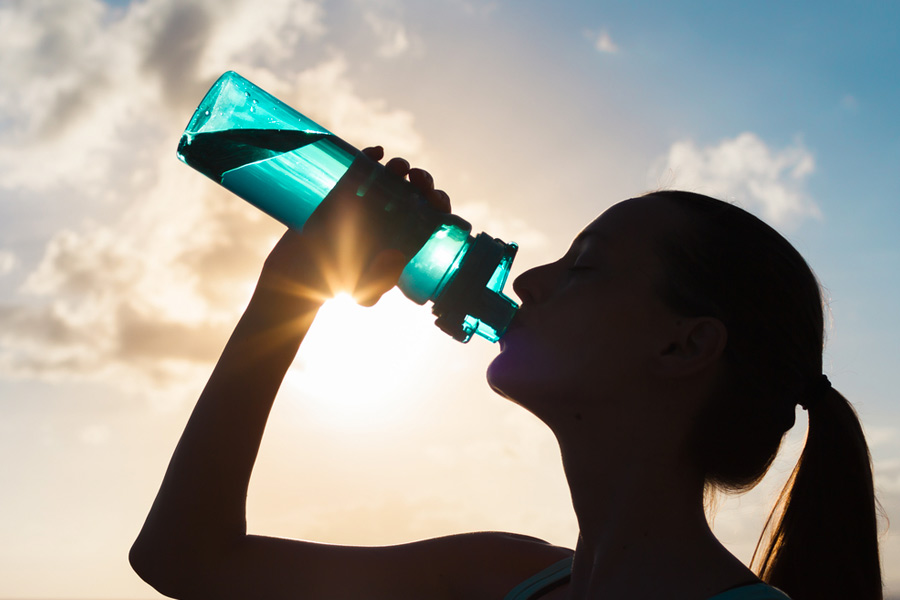It’s often claimed that if you’re trying to lose weight, one of the things you should do each day is drink plenty of water – with some internet advice even suggesting this should be as much as a gallon (about 4.5 litres).
The claim is that water helps burn calories and reduce appetite, which in turn leads to weight loss.
But while we all might wish it was this easy to lose weight, unfortunately there’s little evidence to back up these claims.
Myth 1: water helps burn calories One small study, of 14 young adults, found drinking 500ml of water increased resting energy expenditure (the amount of calories our body burns before exercise) by about 24 per cent.
While this may sound great, this effect only lasted an hour. And this wouldn’t translate to a big difference at all. For an average 70 kg adult, they would only use an additional 20 calories – a quarter of a biscuit – for every 500ml of water they drank.
Get facts about the coronavirus pandemic and the latest research Another study of eight young adults only saw an increase in energy expenditure when the water was fridge cold – reporting a very modest 4 per cent increase in calories burned.
This may be because the body needs to use more energy in order to bring the water up to body temperature, or because it requires more energy for the body to filter the increased volume of fluid through the kidneys. And again, this effect was only seen for about an hour.
So although scientifically it might be possible, the actual net increase in calories burned is tiny. For example, even if you drank an extra 1.5l of water per day, it would save fewer calories than you’d get in a slice of bread.
It’s also worth noting that all this research was in young healthy adults. More research is needed to see whether this effect is also seen in other groups (such as middle-aged and older adults).
Myth 2: water with meals reduces appetite This claim again seems sensible, in that if your stomach is at least partly full of water there’s less room for food – so you end up eating less.
A number of studies actually support this, particularly those conducted in middle-aged and older adults. It’s also a reason people who are unwell or have a poor appetite are advised not to drink before eating as it may lead to under-eating.
But for people looking to lose weight, the science is a little less straightforward.
One study showed middle-aged and older adults lost 2 kg over a 12-week period when they drank water before meals compared with people who didn’t drink any water with their meal.
Younger participants (aged 21-35) on the other hand did not lose any weight, regardless of whether they drank water before their meal or not.
But since the study didn’t use blinding (where information which may influence participants is withheld until after the experiment is finished), it means that participants may have become aware of why they were drinking water before their meal.
This may have led some participants to purposefully change how much they ate in the hopes it might increase their changes of losing weight.
However, this doesn’t explain why the effect wasn’t seen in young adults, so it will be important for future studies to investigate why this is.
The other challenge with a lot of this kind of research is that it only focuses on whether participants eat less during just one of their day’s meals after drinking water.
Although this might suggest the potential to lose weight, there’s very little good-quality evidence showing that reducing appetite in general leads to weight loss over time.
Perhaps this is due to our body’s biological drive to maintain its size. It’s for this reason that no claims can be legally made in Europe about foods which help make you feel fuller for longer with reference to weight loss.
So, although there might be some appetite-dulling effects of water, it seems that it might not result in long-term weight change – and may possibly be due to making conscious changes to your diet.
Just water isn’t enough There’s a pretty good reason why water on its own is not terribly effective at regulating appetite. If it did, prehistoric humans might have starved.
But while appetite and satiation – feeling full and not wanting to eat again – aren’t perfectly aligned with being able to lose weight, it might be a helpful starting point.
Part of what helps us to feel full is our stomach. When food enters the stomach, it triggers stretch receptors that in turn lead to the release of hormones which tell us we’re full.
But since water is a liquid, it’s rapidly emptied from our stomach – meaning it doesn’t actually fill us up.
Even more interestingly, due to the stomach’s shape, fluids can bypass any semi-solid food content that’s being digested in the lower part of the stomach.
This means that water can still be quickly emptied from the stomach. So even if it’s consumed at the end of a meal it might not necessarily extend your feelings of fullness.
If you’re trying to eat less and lose weight, drinking excessive amounts of water may not be a great solution. But there is evidence showing when water is mixed with other substances (such as fibre, soups or vegetable sauces) this can delay how fast the stomach empties its contents – meaning you feel fuller longer.
But while water may not help you lose weight directly, it may still aid in weight loss given it’s the healthiest drink we can choose.
Swapping high-calorie drinks such as soda and alcohol for water may be an easy way of reducing the calories you consume daily, which may help with weight loss.
The Conversation











